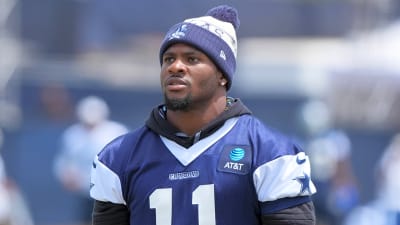
Over the past 25 years, Virginia Tech football has seen its share of highs and lows, from major bowl wins to rebuilding stretches. Through it all, the program has developed some of its most talented players. Here’s a look at my hypothetical all-quarter-century Hokies team:
Quarterbacks: Michael Vick (starter), Tyrod Taylor
I do believe that Vick is the better signal-caller even though I ranked Taylor ahead of him in my "Ranking the Top Five Virginia Tech Quarterbacks Since 2000" article. My reasoning for that was Taylor's stability and better health, but taking them at the peak of their powers, Vick is the premier choice. Taylor provides an exceptionally high floor and can easily take over the reins at quarterback if Vick goes down in this scenario due to injury. If this hypothetical team plays across an entire season, a rotation seems reasonable depending on what squads this juggernaut faces off against.
Running Backs: Bhayshul Tuten, Kevin Jones
Tuten earns his spot thanks to his breakaway speed, but Jones helps make it a more balanced, two-headed backfield. Either of them can be put on the field at any time and of all the positions on the field, I think that tailback could be the deepest all-time position, alongside the receiving corps. Kahlil Herbert, Branden Ore, Lee Suggs and David Wilson are also names I'd toss in the ring for change-of-pace backs, backup options due to injury or punt/kick returners.
Wide Receivers: Isaiah Ford, Cam Philips, Tré Turner
Alongside running back, this squad profiles as a deep unit full of options to choose from. Ten out of the top 11 in career receiving yards played in the 21st century, as shown in the screenshot below:
Isaiah Ford and Cam Phillips are my picks on the outside, with Tré Turner handling the slot.
Ford was the first Hokie to record multiple 1,000-yard receiving seasons, posting 1,164 yards in 2015 and 1,094 in 2016. He led the team in receiving yards for three consecutive seasons and finished his career with 24 touchdown catches, still the most in Virginia Tech history. Phillips, meanwhile, is the only other Hokie to eclipse 960 receiving yards in a single season, hauling in 964 yards and seven touchdowns in 2017.
Although Turner was primarily used on the outside, the draft outlook on him coming out of college was that he could work as a slot receiver.
Here's what the NFL Draft On SI's Cory Ezring said on Turner coming out of the draft:
"One of the nation’s most exciting playmakers, Tré Turner’s explosiveness, flexibility, route running and work after the catch make him an intriguing prospect. All the same, he exhibits underwhelming play strength and inconsistent effort. He projects as an immediate returner on special teams who can see the field on offense from the slot occasionally; he can develop into an inside-outside starting receiver if he learns to beat press."
That versatility and burst makes Turner a solid fit to work at the slot while Ford and Phillips stretch the field.
Tight End: Logan Thomas
Even though Logan Thomas was a quarterback for the Hokies, he ended up converting to tight end in the NFL, hence my reasoning for putting him here.
What makes Thomas especially valuable in this hypothetical lineup is his natural feel for space. His years as a college quarterback gave him a deep understanding of coverages and timing, allowing him to anticipate defensive movements and settle into soft spots — the hallmark of an effective tight end. He knows how quarterbacks read the field because he used to be the one doing it.
On top of that, Thomas brings unique emergency value. If injuries were to decimate the quarterback room, he could easily slot in as a QB3 or QB4. He started 40 games at Virginia Tech, threw for over 9,000 yards, and accounted for 73 total touchdowns — the kind of experience few tight ends can claim.
While he didn’t play tight end for the Hokies, Thomas’s pro résumé and football IQ make him a fitting and versatile choice here. He’s not just a body at tight end — he’s a former quarterback with the awareness to read defenses and the physicality to exploit them. He brings scheme flexibility and insurance in the most critical position group, making him a valuable asset to this all-time Hokies offense.
Offensive Line: Christian Darrisaw, Blake DeChristopher, Jake Grove, Wyatt Teller, Lecitus Smith
This is where the debate gets interesting. Picking the best parts of the 1999 offensive line that stayed past that year seems easy, but how would that project to nowadays since offensive linemen are now bigger than ever? Or does that even matter? For the sake of simplicity, era differences will be disregarded and cross-era adaptability will be assumed. So here's my picks:
For offensive tackles, I'll go with Christian Darrisaw and Blake DeChristopher. DeChristopher started all four years at Tech and cracked the list for the All-ACC first team twice and Darrisaw, who made the cut for First-Team All-ACC in 2020, was the last Hokie to be drafted in the first round of the NFL Draft, which was in 2021 by the Minnesota Vikings. Duane Brown can back up Darrisaw at left tackle; he made it onto the Second-Team All-ACC twice and was selected by the Houston Texans in the first round of the 2008 NFL Draft.
At center, my nod goes to Jake Grove; he won the Rimington Trophy in 2003, was a unanimous All-American that same year and made First-Team All-Big East.
My first guard selection is Wyatt Teller; he qualified for All-ACC First Team in 2018, was the runner-up for the ACC Jacobs Blocking Trophy and earned an invite to that year's Senior Bowl. Teller currently plays for the Cleveland Browns, where he's compiled three Pro Bowl nominations and made the Second-Team All-Pro twice in 2020 and 2021.
My second pick is Lecitus Smith. While both Smith and Teller primarily played left guard, Teller spent some time at offensive tackle during his college career. Given Teller's experience at left guard in both college and the pros, I’m comfortable slotting him into either guard position on this all-time line and doing the same with Smith. In 2020, Smith helped anchor an offensive line that allowed Khalil Herbert to scamper 1,182 rushing yards.
Defensive Line: Antwaun Powell-Ryland, Darryl Tapp
I'd count Bruce Smith if he was eligible for this list; if there's an "All-Time" list regardless of years, he makes it on. Since this takes only the 21st century into account, I'll go with Antwaun Powell-Ryland here, who racked up 25.5 sacks in a pair of campaigns in Blacksburg. Powell-Ryland made First-Team All-ACC last year alongside fellow teammate Aeneas Peebles. Peebles could be a backup on this list, but due to the fact that he only spent a year in Blacksburg, I'm unsure if he makes it as a starter. I'd have him as a backup for now in this scheme.
Tapp makes the cut at the other edge spot, compiling 18.5 sacks across his junior and senior seasons. Tapp currently works as the Washington Commander's defensive line coach.
Lewis was the anchor of Tech’s interior defensive line during its early ACC years. At 6-foot-1 and over 300 pounds, he combined a low center of gravity with quickness off the ball. In 2005, he posted 4.5 sacks and 7.5 tackles for loss. Lewis was a four-year contributor, peaking as a senior when the Hokies fielded one of the nation’s top defenses.
Settle played in only two seasons, but at 6-foot-3, 313 pounds, he notched 12.5 tackles for loss and four sacks in his redshirt sophomore season, being named second-team All-ACC before declaring early for the NFL Draft. Settle remains in the NFL today, currently playing for the Houston Texans, where he tallied five sacks and 31 tackles last year.
Linebackers: Vince Hall, Xavier Adibi
Hall, an inductee of Virginia Tech's Hall of Fame in 2022, notched 396 career tackles, including three seasons with 100 or more. In 2006, he notched 128 tackles, the second-most in the past 25 years. He qualified for Second-Team All-ACC in 2005 and made the First-Team the subsequent year.
Adibi racked up 287 tackles over his four years in Blacksburg, was drafted in the 2008 NFL Draft in the fourth round by the Houston Texans and still remains in Blacksburg today, having taken up the mantle of the Hokies' linebackers coach.
Dax Hollifield is my pick as a backup; he notched 350+ career tackles and currently works in the NASCAR Cup Series as a jackman for the No. 71 car, driven by Michael McDowell.
Defensive Backs: Brandon Flowers, Kyle Fuller, Kam Chancellor, Terrell Edmunds
Flowers was the cornerstone of Tech’s 2007 defense, arguably its best of the century. A first-team All-American that season, Flowers was a shutdown corner who combined tight coverage with elite ball skills, finishing his career with 158 tackles and 10 interceptions. He was a second-round pick in the NFL Draft and started over 100 games as a pro.
Fuller, a technician in man coverage with strong tackling ability, was a first-round pick and developed into a Pro Bowl cornerback in the NFL. At Tech, he posted 173 tackles and six interceptions, often shadowing opponents' top targets.
Kam Chancellor (2006–2009) is the most feared safety in program history. At 6-foot-3, 225 pounds, he played rover, corner, and eventually strong safety for the Hokies. His physicality, range, and leadership helped power Tech’s 2007–2009 defenses. Chancellor went on to become a four-time Pro Bowler and Super Bowl champion with the Seahawks.
Edmunds rounds out the group as a hybrid safety/-linebacker who played all over the field, compiling 196 tackles and six interceptions.
Place Kicker: John Love
Love takes the spot here to his accuracy, having nailed all but two of his 18 field goal attempts last year. Joey Slye is another option that could be used here; the former Hokie holds the franchise record for longest field goal for both the Washington Commanders (61 yards) and the New England Patriots (63). I'm taking Love both for his accuracy and his power; he sits second all-time for the longest field goal in Hokies history, only behind Wayne Latimer's 61-yarder back in 1975.
Punter: Oscar Bradburn or Peter Moore
This one is a toss-up; Bradburn and Moore top the Hokies' punt average with 43.5 and 43.3 yards per return, respectively. Either pick would do wonders for the Hokies here.
More must-reads:
- Matt Campbell finalizes program-friendly contract extension with Iowa State
- Lando Norris wins Hungarian Grand Prix
- The 'NFL mascot names' quiz
Breaking News
Trending News
Customize Your Newsletter
 +
+
Get the latest news and rumors, customized to your favorite sports and teams. Emailed daily. Always free!








